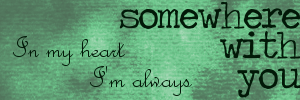Please note that this Special Feature will be closing Wednesday evening of this week, after which you may discuss WWII and related topics in the ongoing History thread (History nerds hangout, which may be on one of the latter pages in the Spare Oom.)

Signature by Narnian_Badger, thanks! (2013)
7,237 posts from Forum 1.0
Wow, closing soon--I'm sorry I didn't find this thread sooner! I have an interest in WWII also--the whole world and people of that time is fascinating.
Strange stuff, eh? Sometimes I find it so odd that these kind, gentle old men once sat in the gunnery chairs of 5 inch or 50 caliber anti-aircraft guns, or in the cockpit of a fighter or bomber, and went through so much and still came out ok...it's a difficult thing to grasp.
It is strange! There is a quiet, unassuming old man at my church who, we found out, was a spy in Germany during the War. He spoke fluent German, lived the life of a trusted, upper-level authority, was responsible for information leading to the demise of some top Nazi generals. It's hard to imagine the stress levels of a job like that!
As for literature and movies, I like Empire of the Sun (also a good autobiographical novel by J.G. Ballard), Bridge on the River Kwai (someone mentioned this movie is fatalistic and depressing--I always found it grimly hilarious), Life is Beautiful (always go subbed! Never dubbed!), The Boy in the Striped Pajamas, Jakob the Liar, Letters from Iwo Jima (the companion film Flags of Our Fathers, not so much).
Another good film for history buffs is Japan's Longest Day, about the Japanese surrender. I thought it was interesting that the message in the end was not for peace, but that Japan never have to surrender again. 
And I can't recommend enough the book Evidence Not Seen by Darlene Deibler Rose, a missionary to Malayasia who was taken to a prison camp when the Japanese invaded. Her newlywed husband was killed in a camp but she lived to tell her miraculous story of God's protection and care. This book gave me goosebumps many times! And then it is interesting to compare her camp experience with the one, say, in Empire of the Sun. The Christian prisoners in Evidence Not Seen did not become such beasts, and were able to survive without sacrificing their humanity. I haven't seen Paradise Road yet but it's been on my Netflix Queue for a while...I should bump it up.^^

There is a quiet, unassuming old man at my church who, we found out, was a spy in Germany during the War. He spoke fluent German, lived the life of a trusted, upper-level authority, was responsible for information leading to the demise of some top Nazi generals.
Wow! I've never met such people before.  Evidence Not Seen by Darlene Deibler Rose ... thanks for the book recommendation. And you have to see Paradise Road!
Evidence Not Seen by Darlene Deibler Rose ... thanks for the book recommendation. And you have to see Paradise Road! 
I just remembered We Were Soldiers, with Madeleine Stowe and Mel Gibson. I saw about 20-30 minutes of this movie, but never had the chance to see the whole thing. Who has? Did you like it or not, and why?
Before the thread closes, I just want to thank everyone for posting their thoughts on WWII. I've never had such a popular thread. 

I have recently been wondering about the thoughts of the German people nowadays, about World War II. Do they feel bitter about it?
Here we are, remembering the War and learning about it and sitting happily in the knowledge that we won, but what about them? Do they still believe that the ideals of Hitler were worthy? Perhaps some of them did not realize the actual atrocity of his actions and served faithfully, and it's not until now that they know that they were on the "wrong" side. Or perhaps they think that the Allies were the "wrong" side. I don't know...
It's really strange to think about how they must feel, how their veterans must be. I know that one of the main causes of WWII was that Germany was very bitter about the conclusion of World War I (because basically everyone in the world blamed them for everything that happened and gave them horrible surrender terms). It makes me curious.
"Let the music cast its spell,
give the atmosphere a chance.
Simply follow where I lead;
let me teach you how to dance."
Do they still believe that the ideals of Hitler were worthy?
Ohhh boy. Please, never go to Germany and say that 
From what I've picked up from visiting the country, they're still very sensitive about it. They're glad the Allies won but the effects of the war were devastating. It must be hard growing up dealing with that in your country's past, I always got the feeling from a good friend of mine that he felt the burden of it, despite his family not having played much of a role in the war.
It might be interesting for you to note that the sale and production of Mein Kampf is illegal in Germany and Austria, but not so in the USA and the UK.
There is a crack in everything, that's how the light gets in.
*catches foot in the door before the thread closes*
I'm a WWII geek but I only know about civilians. Does that even count?
I've been reading about the Blitz, the Holocaust, resistance movements, etc for a long while now, but don't know anything about the major battles more than their names and who won.
Same here (same subjects too). I feel like I know so much less than I originally thought after reading through this thread packed full of battle data. 
I've seen a few mentions of "Number the Stars" by Lois Lowry so I'll throw my recommendation in along with them as it was a fantastic little book that packed so much into so few pages. Tricia Goyer also has a great WWII series ("World War II Liberators", historical fiction) that I received for Christmas, along with a stand-alone novel called "The Swiss Courier".
Movies that I've viewed: Battle of Britain, The Sound of Music, Empire of the Sun, The Lion the Witch and the Wardrobe, and Valkyrie. If you can completely ignore the non-German accent fact, it wasn't too terrible of a film.
I'd love to view Schindler's List at some point in my life as it looks to be an absolutely brilliantly made film while not deviating from the reality of the era.
Also, the theme that John Williams composed for it has got to be the most beautiful piece of music that he has ever created.
Also, I had an opportunity to visit the Holocaust Memorial Museum while I was in high school. Extremely impacting experience for anyone who visits. It was quite hard to actually pay close attention to all of the archives for very long without becoming completely overwhelmed. Reading a history textbook is nothing compared to actually being faced with the numbing reality that the events we read about actually did happen. The Holocaust was real, the people were real, everything that they faced was very real- it wasn't just something written on paper. I'd recommend visiting the memorial at least once.
Somewhat unfortunately though, the group I ended up with sort of blew through the whole thing in a hurry so I missed several of the archives. 
I would love to go back some time though to learn even more.
I have recently been wondering about the thoughts of the German people nowadays, about World War II. Do they feel bitter about it?
I've never personally known any Germans, I've only met a few along the way, but they struck me as kind and generous folks. I can't imagine that the loss of WW2 doesn't sting them a bit. No one likes losing a war (or a basketball game, or a game of Chess, or a bet, or anything for that matter), and I'm sure its probably buried there in the collective counsciousness of the country. What complicates the matter is that Germany has a very rich and proud military history...they're a disciplined bunch of folks who pride themselves on the matter and to lose a war with such totality probably makes it hurt a bit more than one would initially think.
And always bear in mind that the public's perception of Germans of the era was that they were all Nazis, and this simply wasn't the case, and they're unfortunately portrayed that way in many films and media, and that can be damaging as well. Some of these folks were just people doing their jobs as best they could and trying to survive, no different than you or I would. I think there is a sense of remorse in Germany in that they're one of the few regular allies of modern day Israel and often back them up when Israel's taking a public beating. So when you come across Germans be kind and generous, as you would to anyone else. They've done their best to patch things up and make it better.
Kennel Keeper of Fenris Ulf

I have met a few Germans, and being young people they weren't really different from your average American young people--the war doesn't seem to affect them that much.
No one likes losing a war (or a basketball game, or a game of Chess, or a bet, or anything for that matter), and I'm sure its probably buried there in the collective counsciousness of the country.
Add to this the fact that, although it hurts to lose a war, I'm sure the German people are glad the Nazi movement was defeated and squelched.
I think there may be more hurt on the Japanese side of things, because a lot of people still chafe at demilitarization and dependency on America and such, whereas Germany doesn't have to deal with that. To a lot Japanese young people, the war isn't well remembered: "Oh! I know about that war. There was a huge bomb." A futile war is so humiliating it's simply not talked about. But it still colors their lives--many Japanese people now mistrust their government or anything that has to do with strong dedication to an idea (one reason why Christianity still fails to catch on in Japan, I think), and in the family father-figures have lost a lot of respect. I think the current Japanese love of "cute" was also a product of the war...wanting to eschew anything remotely connected to that masculine, warlike past that brought you so much trouble makes you crave HelloKitty, I guess.

One time I went with some Japanese friends to a presentation/concert in memorial of the atomic bombs on Hiroshima and Nagasaki. I was curious as to their reactions and hoped we could have some good discussion afterwards...but 10 minutes into the talk they were either asleep or texting. 

Before this thread closes... 
I've met only 2 or 3 Germans in my life. All were kind. All were Catholic . And none mentioned Hitler or World War II. But I didn't care. My favorite teacher in grad school was German. She taught my German language class. 
I'm curious. What do people know about the rise of neo-Nazism in Europe and America? How much of a factor is it in international politics, esp. regarding Israel, as Shadowlander mentioned? 
And always bear in mind that the public's perception of Germans of the era was that they were all Nazis, and this simply wasn't the case, and they're unfortunately portrayed that way in many films and media, and that can be damaging as well. Some of these folks were just people doing their jobs as best they could and trying to survive, no different than you or I would.
Agreed. This is why I love stories about German Christians like Dietrich Bonhoeffer helping Jews, sharing the gospel, and standing up for Christ in the face of national opposition. Not all churches did what Hitler wanted. Many German Christians put Jesus before their country. We should all do that. 
qwerty: I've never been to the Holocaust Memorial Museum, even though I lived half an hour from DC for four years. My mother wasn't interested and I never had the chance to go alone. I'd still like to go though. 
I'm not saying this as a mod just yet, but I would advise being careful with the subject of neo-Nazism as it does stray into politics, especially when we involve Israel and current day Europe, where it's a particularly contentious subject right now.
There is a crack in everything, that's how the light gets in.
I have recently been wondering about the thoughts of the German people nowadays, about World War II. Do they feel bitter about it?
Here we are, remembering the War and learning about it and sitting happily in the knowledge that we won, but what about them? Do they still believe that the ideals of Hitler were worthy? Perhaps some of them did not realize the actual atrocity of his actions and served faithfully, and it's not until now that they know that they were on the "wrong" side. Or perhaps they think that the Allies were the "wrong" side. I don't know...
It's really strange to think about how they must feel, how their veterans must be. I know that one of the main causes of WWII was that Germany was very bitter about the conclusion of World War I (because basically everyone in the world blamed them for everything that happened and gave them horrible surrender terms). It makes me curious.
All the Germans I've met, including some of my relatives, either
A. don't think about it, it's a part of history and they think history is boring
or
B. are very thankful the Allies won.
There were many German people who had no idea the holocaust was happening, and many soldiers who didn't want to fight but of course had to.

I've read stories of German's who opposed the Holocaust and the war. There were German's who believed it was wrong and helped the Jews escape.

I have recently been wondering about the thoughts of the German people nowadays, about World War II. Do they feel bitter about it?
And always bear in mind that the public's perception of Germans of the era was that they were all Nazis, and this simply wasn't the case, and they're unfortunately portrayed that way in many films and media, and that can be damaging as well. Some of these folks were just people doing their jobs as best they could and trying to survive, no different than you or I would. I think there is a sense of remorse in Germany in that they're one of the few regular allies of modern day Israel and often back them up when Israel's taking a public beating. So when you come across Germans be kind and generous, as you would to anyone else. They've done their best to patch things up and make it better. I have recently been wondering about the thoughts of the German people nowadays, about World War II. Do they feel bitter about it?
You could be right, Shadowlander! You should read Bernt Engelman's In Hitler's Germany to realise what it might have been like growing up during that era in Berlin and other German cities. It is sobering to think that the carnage that actually happened could have been even worse had not ordinary German people risked their lives to protect friends, neighbours, even strangers. Nor should Germans bear the sole responsibility for the Holocaust plus the horrors of those years.
Another book, Surviving Hitler: corruption and compromise in the Third Reich (Adam Lebor & Roger Boyes), helps explain how an Axis country like Bulgaria, could resist the Nazi regime's anti-Jewish program, how Denmark, which succumbed to German invasion much quicker than did the Poles, could spirit away most of its Jews to neutral Sweden, whilst Spain, a neutral country that was more than friendly to Germany, still protected many that fled there, regardless of religion or ethnicity.
Here we are, remembering the War and learning about it and sitting happily in the knowledge that we won, but what about them?
I've heard from those of German extraction who migrated here, who were neighbours, workmates etc, that ordinary Germans often had a really miserable time at the end of WW2. The Russians, when they invaded, were in a vengeful frame of mind, and treated fleeing Germans badly. It didn't help that there was a general reorganization of national boundaries. Stalin wanted a third of Poland, mainly around Lvov (Galicia) and in recompense, Poland got a slice of Germany which included Pomerania on the Baltic coast and all the area between Stettin (can't spell the Polish version  ) and Poznan. The resulting shifts in population was really atrocious by all accounts.
) and Poznan. The resulting shifts in population was really atrocious by all accounts. 
Nowadays the land Stalin wanted is now part of Belarus or Ukraine, not sure which. Yes, WW2 did have its impetus in the Treaty of Versailles. But directly after WW2 had officially finished, the Cold War started, thanks to Stalin. And that was to influence world history right up to 1989.
